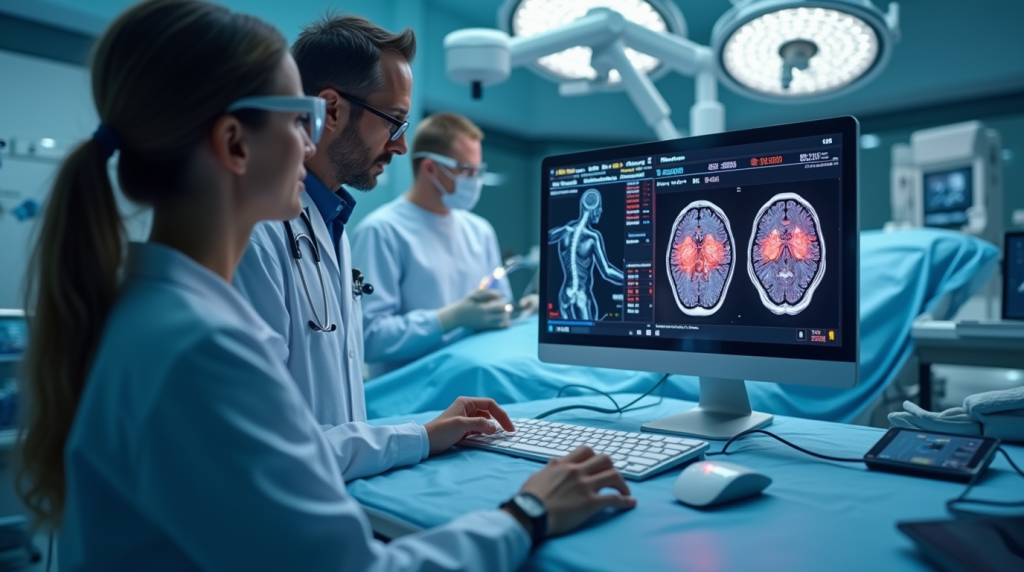Artificial Intelligence (AI) is transforming healthcare at an unprecedented pace, offering groundbreaking solutions to long-standing challenges. From early disease detection to personalized treatment plans, AI-powered tools are enhancing diagnostic accuracy, streamlining workflows, and improving patient outcomes. According to a 2023 report by Accenture, AI applications in healthcare could save the U.S. healthcare economy $150 billion annually by 2026.
The integration of AI into healthcare isn’t just a futuristic concept—it’s happening now. Hospitals, research institutions, and tech companies are leveraging machine learning (ML), natural language processing (NLP), and robotics to revolutionize medical practices. However, this transformation also raises ethical concerns, including data privacy, algorithmic bias, and the role of human oversight.

In this comprehensive guide, we’ll explore:
- How AI is improving diagnostics and imaging.
- The role of AI in personalized medicine and drug discovery.
- Real-world applications in robotic surgery and virtual nursing assistants.
- Ethical challenges and the future of AI in healthcare.
The Future of Telemedicine and Remote Patient Monitoring]
1. AI in Medical Diagnostics and Imaging
1.1 AI-Powered Radiology and Pathology
AI algorithms are now outperforming human radiologists in detecting anomalies in X-rays, MRIs, and CT scans. Key advancements include:
- Google’s DeepMind can identify breast cancer from mammograms with 94.5% accuracy, reducing false positives by 5.7% (Nature, 2020).
- IBM Watson for Oncology analyzes medical literature to recommend personalized cancer treatments.
1.2 Early Disease Detection
AI models predict diseases before symptoms appear:
- Stanford’s AI system detects pneumonia from chest X-rays faster than radiologists.
- Apple Watch’s ECG feature identifies atrial fibrillation (AFib) with 97% sensitivity.
“How AI is Making Healthcare More Accurate”
2. Personalized Medicine and Drug Development
2.1 Genomics and AI-Driven Treatment Plans
AI analyzes genetic data to tailor therapies:
- CRISPR-based AI tools help design gene therapies for rare diseases.
- Tempus Labs uses AI to match cancer patients with clinical trials based on their DNA.
2.2 Accelerating Drug Discovery
Traditional drug development takes 10+ years and $2.6 billion per drug (Tufts University). AI is changing this:
- DeepMind’s AlphaFold predicts protein structures, speeding up drug design.
- BenevolentAI identified baricitinib as a COVID-19 treatment in 48 hours.
[The Role of Big Data in Modern Medicine]
3. AI in Surgery and Patient Care
3.1 Robotic-Assisted Surgery
- Da Vinci Surgical System enables minimally invasive procedures with smaller incisions and faster recovery.
- Autonomous surgical robots (e.g., Smart Tissue Autonomous Robot – STAR) perform suturing with superhuman precision.
3.2 Virtual Nursing Assistants
- Sensely’s AI nurse “Molly” provides 24/7 patient monitoring via chatbots.
- Babylon Health’s AI triage reduces ER visits by 30% (NHS study).
4. Ethical and Regulatory Challenges
4.1 Data Privacy and Bias Risks
- HIPAA compliance is critical for AI handling patient data.
- Algorithmic bias: A 2019 Science study found racial bias in an AI used for healthcare prioritization.
4.2 The Need for Human Oversight
- FDA’s AI/ML-Based Software as a Medical Device (SaMD) framework ensures safety.
- Human-in-the-loop (HITL) systems balance automation with doctor input.
5. The Future of AI in Healthcare
Emerging trends include:
- AI-powered nanobots for targeted drug delivery.
- Predictive epidemiology (e.g., AI tracking disease outbreaks).
- Brain-computer interfaces (BCIs) for paralysis patients.
Conclusion
AI is reshaping healthcare by improving diagnostics, personalizing treatments, and automating surgeries. While challenges like bias and regulation persist, the potential for better, faster, and more affordable care is immense. As AI evolves, collaboration between technologists, doctors, and policymakers will be key to ethical adoption.
For more insights, explore our article on The Future of Telemedicine.
References & Citations
- Nature – AI in Breast Cancer Detection
- FDA – AI in Medical Devices
- Science – Racial Bias in Healthcare AI
- Wikipedia – Artificial Intelligence in Healthcare
By embracing AI responsibly, we can build a healthcare system that’s more precise, accessible, and equitable for all.
